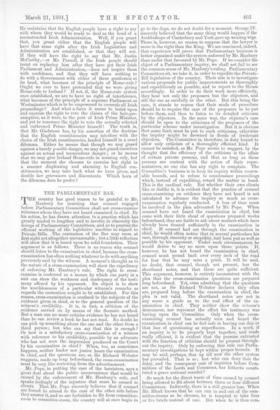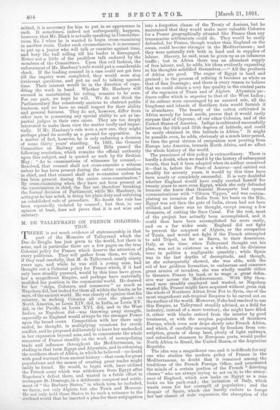THE PARLIAMENTARY BAR. T HE country has good reason to be
grateful to Mr. Hanbury for insisting that counsel engaged before Parliamentary Committees shall not cross-examine witnesses whom they have not heard examined in chief. By his action, he has drawn attention to a practice which has greatly tended to lengthen and to involve in obscurity the doings of Parliamentary Committees, and so to pre.vent the efficient working of the legislative machine in regard to Private Bills. The contention of the Bar may seem at first sight not altogether unreasonable ; but a little reflection will show that it is based upon ho solid foundation. Their argument is as follows. There is no reason why counsel should listen to the examination in chief, because the cross- examination has often nothing whatever to do with anything previously said by the witness. A moment's thought as to the nature of a cross-examination will show the expediency of enforcing Mr. Hanbury's rule. The right to cross- examine is conferred as a means by which one party in a suit can show the weakness and inadequacy of the testi- mony offered by his opponent. Its object is to show the worthlessness of a particular witness's remarks as regards the contention sought to be established. For this reason, cross-examination is confined to the subjects of the evidence given in chief, or to the general question of the witness's credibility. It is, in fact, a criticism of the evidence carried on by means of the Socratic method. But a man can no more criticise evidence he has not heard than he can review a book he has not read. No doubt he can pick up something about the one and. the other from a . third person ; but who can say that this is enough ? Or how is a satisfactory cross-examination of a witness with reference to his credibility, possible by an advocate who has not seen the impression produced on the Court by his examination in chief ? When, too, as sometimes happens, neither leader nor junior hears the examination in chief, and the questions are, as Sir Richard Webster suggests, made up long beforehand, the cross-examination must be very like reviewing from the advertisement. Mr. Pope, in putting the case of the barristers, says a great deal about the public inconvenience that would be caused by the enforcement of Mr. Hanbury's rule, and speaks feelingly of the injustice that must be caused to clients. That Mr. Pope sincerely believes that if counsel are forced to attend to the case of the other side before they answer it, and so are forbidden to flit from committee- room to committee-room, the country will at once begin to go to the dogs, we do not doubt for a moment. George IV. sincerely believed that the same thing would happen if the Archbishops of Canterbury and York gave up wearing wigs. There is, however, no reason to suppose that the lawyer is more in the right than the King. We are convinced, indeed, that experience will prove that Parliamentary business is better organised under the system enforced by Mr. Hanbury than under that favoured by Mr. Pope. If we consider the object of a Parliamentary inquiry, we shall not fail to see the common-sense of Mr. Hanbury's ruling. Parliamentary Committees sit, we take it, in order to expedite the Private- Bill legislation of the country. Their aim is to investigate various proposals for public improvements as thoroughly and expeditiously as possible, and to report to the House accordingly. In order to do their work more efficiently, they hear not only the proposers but the objectors, and sift the one as carefully as the other, But this being the case, it stands to reason that their mode of procedure should be to require the case of the proposers to be put before them, and then to listen to its detailed criticism by the objectors. In the same way, the objector's case should be open to the criticisms of the proposers of the particular scheme under investigation. But it is obvious that some limit must be put to such criticisms, otherwise the inquiry might be drowned in floods of irrelevant objection. The Committee is, therefore, in duty bound to allow only criticism of a thoroughly efficient kind. It cannot be satisfied, as Mr. Pope seems to suggest, by the thought that the efficiency of the criticism is the affair of certain private persons, and that as long as these persons are content with the action of their repre- sentatives, no one else has any right to complain. The Committee's business is to keep its inquiry within reason- able bounds, and to refuse to countenance proceedings which, instead of expediting, retard the matter in hand. This is the cardinal rule. But whether their own clients like or dislike it, it is evident that the practice of counsel cross-examining on evidence they have not heard is not calculated to advance the inquiry so much as cross- examination regularly conducted. A loss of time must be involved in the plan advocated by Mr. Pope. When counsel have not heard the examination in chief, but come with their little sheaf of questions prepared weeks beforehand, they are liable to ask about matters which have already been treated sufficiently in the examination in chief. If counsel had sat through the examination in chief, he would often notice that in several particulars his case, through sincerity or stupidity, had been put as well as possible by his opponent. 1.7nder such circumstances, he would desire to say no more upon these points. If, however, he has not heard the examination in chief, counsel must pound back over every inch of the road for fear that he may miss a point. It will be said, no doubt, that counsel, though not present, has the shorthand notes, and that these are quite sufficient. This argument, however, is entirely inconsistent with the plea that the cross-examination questions are prepared long beforehand. Yet, even admitting that the questions are not, as Sir Richard Webster declares they often are, prepared long before the examination in chief, the plea is not valid. The shorthand notes are not in any sense a guide as to the real effect of the ex- amination in chief. They neither show the wi tness's demeanour, nor represent the effect his testimony was having upon the Committee. Only when the cross- examining counsel has actually seen and heard the examination in chief can he feel safe in leaving out this or that line of questioning as superfluous. In a word, if an inquiry is to be properly kept together, and made really efficient, it is evident that the persons entrusted with the function of criticism should be present through- out the inquiry.. Only by enforcing this rule can Parlia- mentary investigations be kept within proper bounds. It may be said, perhaps, that up till now the other system has prevailed. That is so ; but who can deny that the delay, and the consequent cost of inquiries before Cotn- mittees of the Lords and Commons, has hitherto consti- tuted a grave national scandal ?
So much for the direct waste of time caused by counsel being allowed to flit about between three or four different Committees. Indirectly, there is a still greater loss. When Mr, Blank knows that he can run in and out of the com- mittee-rooms as he chooses, he is tempted to take four or five briefs instead of one. But when he is thus corn- mitted, it is necessary for him to put in an appearance in each. It sometimes, indeed not unfrequently, happens, however, that Mr. Blank is actually speaking in Committee. room No. 1 when he is wanted to begin cross-examining in another room. Under such circumstances, it is necessary to put up a junior who will talk or examine against time, and keep the ball rolling till his leader is disengaged. Hence not a little of the profitless talk endured by the members of the Committees. Upon this evil fashion, the enforcement of Mr. Hanbury's rule would put a considerable check. If the leading counsel in a case could not get free till the inquiry were completed, they would soon stop irrelevant questions, and put an end to talking against time. Their interest would lie in the direction of expe- diting the work in hand. Whether Mr. Hanbury will succeed in maintaining his ruling, remains to be seen. For our part, we hope he will. We do not think the Parliamentary Bar consciously anxious to obstruct public business, and. we have no small respect for their ability and general fairness. They do not, however, differ from other men in possessing any special ability to act as im- partial judges in their own cause. They are too deeply interested to make them view the matter coolly and impar- tially. If Mr. Hanbury's rule were a new one, they might perhaps plead its novelty as a ground for opposition. As a matter of fact, however, he is only enforcing a decision of some thirty years' standing. In 1861, the General Committee on Railway and Canal Bills passed the following resolution, which remains the official authority upon this subject, and is quoted as such by Sir Erskine May "As to examinations of witnesses by counsel,— Resolved, that counsel shall not cross-examine a witness unless he has been present during the entire examination in chief, and that counsel shall not re-examine unless he has been present during the entire cross-examination." By cross-examining when they have not been present at the examination in chief, the Bar are therefore breaking the formal decision of Parliament, while Mr. Hanbury, in acting as he has acted, is doing his plain duty and enforcing an established rule of procedure. No doubt the rule has been repeatedly violated by counsel ; but that, in our opinion at least, does not prove that it is not wise and salutary.



































 Previous page
Previous page